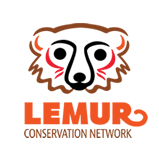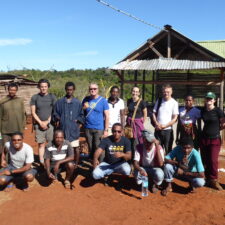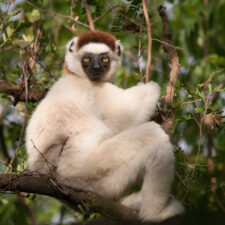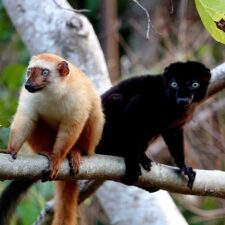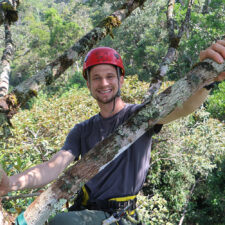To reduce the risk of lemur exposure to COVID-19, Drs. Thomas R. Gillespie, Patricia Wright, and Jonah Ratsimbazafy bring us these guidelines for ecotourism and research sites in Madagascar.
» Vakio eto ny bilaogy amin’ny teny Malagasy (Read in Malagasy)
The World Health Organization has declared a global public health emergency in response to the Novel Coronavirus (COVID-19) Pandemic and there is now evidence of infection with the virus causing COVID-19 in Madagascar.1
As we prepare for this public health emergency, we must also recognize the potential threat of this pandemic to Madagascar’s lemurs.
Wild chimpanzees have experienced respiratory outbreaks following infection by human coronaviruses2 and it is highly probable that chimpanzees and other non-human primates, such as lemurs, are similarly susceptible to the virus causing COVID-19. Scientific research, ecotourism, and current conservation and management paradigms all have the capacity to subject habituated wild primates to risks of human pathogen exposure.
Considering these risks, it is recommended to suspend lemur tourism and reduce research activities subject to risk assessments to maximize conservation outcomes.
The IUCN Best Practice Guidelines for Health Monitoring and Disease Control in Great Ape Populations3 were developed in response to a series of mortality events in habituated apes linked to human respiratory virus exposure4-6 and a greater recognition of the ease of wild ape exposure to human enteric pathogens.7,8 Fortunately, the majority of these guidelines are broadly applicable to habituated primates and are particularly relevant to the current COVID-19 pandemic.
5 Guidelines for Reducing the Risk of Lemur Exposure to COVID-19
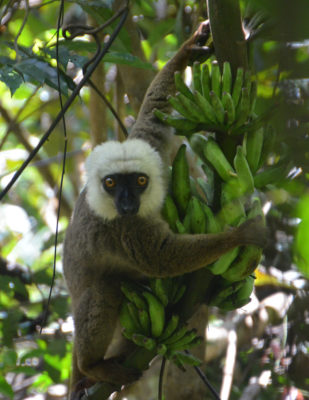
Red fronted brown lemur in Marojejy National Park. Photo by Lynne Venart.
Implementing the following key guidelines across ecotourism and research sites in Madagascar for essential staff who continue to enter lemur habitat during the pandemic will substantially reduce the risk of lemur exposure to the virus causing COVID-19 or the multitude of other pathogens we may unintentionally introduce when we enter lemur habitats.
1. Sick? Stay home.
No individual with clinical symptoms (i.e., nasal discharge, sore throat, cough, or fever) should enter lemur habitat.
2. Start clean for each visit.
Individuals entering lemur habitat should wear clean clothing. Footwear should be disinfected and hands should be washed with soap and water before entering and again upon leaving habitat.
3. Stay away.
Individuals should maintain a minimum distance of 7 meters from lemurs.
4. Wear a face mask.
Individuals within 10 meters of lemurs should wear a surgical mask.
5. Sneeze right.
If an individual must sneeze or cough while in proximity to lemurs, they should keep their mask on, turn away from animals, and cover mouth and nose with the crook of the elbow rather than the hand, or sneeze inside their clothing.
The current COVID-19 pandemic should be considered a potential threat to the health of wild lemurs.
There is no such thing as a zero disease risk and taking measures to prevent or control disease will never eliminate all risks. Therefore, the recommendations herein are primarily aimed at minimizing, rather than trying to eliminate, the threat of disease transmission from humans to wild lemurs. Despite this caveat, implementing these best practices should substantially reduce the risks that human activities pose to lemur health and signal a clear commitment to primate conservation in Madagascar.
Sources
1https://www.who.int/emergencies/diseases/novel-coronavirus-2019
2Patrono, L. V., Samuni, L., Corman, V. M., Nourifar, L., Röthemeier, C., et al. (2018). Human coronavirus OC43 outbreak in wild chimpanzees, Côte d´Ivoire, 2016. Emerging Microbes & Infections 7: 118. https://doi.org/10.1038/s41426-018-0121-2
3Gilardi, K.V., Gillespie, T.R., Leendertz, F.H., Macfie, E.J., Travis, D.A., Whittier, C.A., Williamson, E.A. (2015). Best Practice Guidelines for Health Monitoring and Disease Control in Great Ape Populations. Gland, Switzerland: IUCN SSC Primate Specialist Group. 56pp. https://portals.iucn.org/library/sites/library/files/documents/SSC-OP-056.pdf
4Köndgen, S., Kühl, H., N’Goran, P.K., Walsh, P.D., Schenk, S. et al. (2008). Pandemic human viruses cause decline in endangered great apes. Current Biology 18: 260–264.
5Kaur, T., Singh, J., Tong, S., Humphrey, C., Clevenger, D. et al. (2008). Descriptive epidemiology of fatal respiratory outbreaks and detection of a human-related metapneumovirus in wild chimpanzees (Pan troglodytes) at Mahale Mountains National Park, western Tanzania. American Journal of Primatology 70: 755–765.
6Palacios, G., Lowenstine, L.J., Cranfield, M.R., Gilardi, K.V., Spelman, L. et al. (2011). Human metapneumovirus infection in wild mountain gorillas, Rwanda. Emerging Infectious Diseases 17: 711–713.
7Rwego, I.B., Isabirye-Basuta, G., Gillespie, T.R. & Goldberg, T.L. (2008). Gastrointestinal bacterial transmission among humans, mountain gorillas, and livestock in Bwindi Impenetrable National Park, Uganda. Conservation Biology 22: 1600–1607.
8Parsons, M.B., Travis, D., Lonsdorf, E.V., Lipende, I., Roellig, D.M., Collins, A., Kamenya, S., Zhang, H., Xiao, L. & Gillespie, T.R. (2015). Epidemiology and molecular characterization of Cryptosporidium spp. in humans, wild primates, and domesticated animals in the Greater Gombe Ecosystem, Tanzania. PLoS Neglected Tropical Diseases 9: e0003529.
Prepared by:
Thomas R. Gillespie, PhD
Associate Professor, Emory University and Rollins School of Public Health, Atlanta, USA
Director of Infectious Disease Research, Centre Valbio, Ranomafana, Madagascar
thomas.gillespie@emory.edu
http://www.envs.emory.edu/faculty/GILLESPIE/Lab.html
Patricia C. Wright, PhD
Herrnstein Professor of Conservation Biology, Stony Brook University, Stony Brook, USA
Founder and Executive Director, Centre ValBio, Ranomafana, Madagascar
patchapplewright@gmail.com
www.patwrightlab.net
Jonah Ratsimbazafy, PhD
President, Groupe d’Etude et de Recherche sur les Primates de Madagascar (GERP)
President-Elect, International Primatological Society
Co-Vice Chair – Madagascar section, IUCN/SSC Primate Specialist Group
jonah@gerp-mg.org
www.gerp.mg
